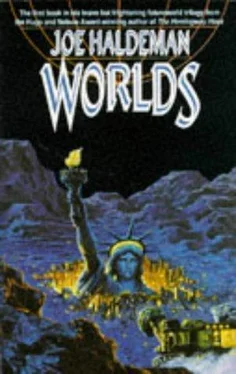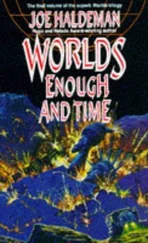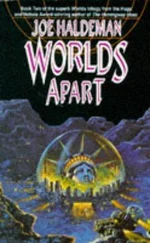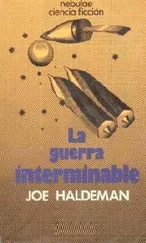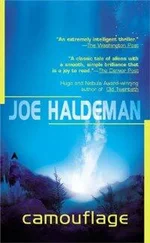The fourteenth was a Friday, so O’Hara was to have her weekly walk in the park with John Ogelby.
Deformed people were rare in the Worlds, but John Ogelby would not describe himself any other way: hunch-backed, bandy-legged, sticks for arms; he walked like a cartoon character and was barely a meter tall. He had come to the Worlds because low gravity was the best, safest anodyne for the constant aching in his joints, and because he suspected that a small world was like a small town: people got used to you and stopped staring.
He was well liked in the low-gravity engineering facility where he worked. He was a brilliant and careful worker, and had learned how to be affable in spite of a natural tendency to use his wit and deformity as a double-edged weapon. He did devastatingly grotesque imitations of video stars and political figures.
But he was wrong about this World being small. With more than two hundred thousand people, there was always someone seeing him for the first time, starting and staring. He got used to it, but could not stop noticing it.
So Ogelby was mildly surprised when he first met Marianne O’Hara. She didn’t jump. She looked at him without staring, the way very old people sometimes did, and then walked over with a glass of punch—the bowl was obviously too high for him to reach—and spent the rest of the afternoon talking with him, with frankness and sympathy. She came up to look at his lab the next day, and they had dinner.
What developed was not exactly a love affair. Love can be driven by pity, and it can even be fueled by curiosity and a thirst for intellectual companionship, but that was not the case here. O’Hara was in love already, with Charlie Devon, and John’s complicated strengths and weaknesses served to counterbalance Charlie’s simple ones. The two men met once and liked each other cautiously, but Charlie privately could not understand how O’Hara could get used to looking at the hunchback, and John could not drive away the vision of Marianne lost in those strong arms. If you asked either of them, he would say that he was glad there was someone to give O’Hara what he could not (John would say “perforce”).
O’Hara spent more time with John than with Charlie: playing games, exploring New New, incessantly talking and joking. Every Friday they met for lunch and a long walk in the park. John wasn’t particularly comfortable there, but knew that if he didn’t exercise in high gravity he would suffer progressive myasthenia and eventually be unable to leave the low-gravity section where he lived and worked. He was usually rather giddy on the Friday walks, because the pain pills made him light-headed.
He hadn’t taken any pills this Friday, the fourteenth, and his knees and hips and curved spine throbbed with tiny pulses of fire while he waited at the outdoor restaurant. He was the only customer.
Marianne came briskly down the pathway, brushing out her wet hair, and started to apologize for having been held up at the pool’s dressing room, but Ogelby cut her short with a voice that surprised both of them, a harsh croak:
“Have you heard about the Ladder?”
“Jacob’s Ladder?”
“It’s coming down.” She furrowed her brow, not understanding. “It’s going to crash. They can’t save it.”
“H-how?”
On the way to the lift that would take them up to Ogelby’s flat, he told O’Hara about the incredibly botched correction maneuver; about the shuttles that had come up with emergency engines, too late. On its second pass through the atmosphere, the cross-shaped structure had picked up rotation and wobble; it couldn’t be docked with. Many of the congregation had been killed when the satellite started rotating, the artificial gravity sliding them down to the ends of the cross’s arms, then crushing them under a load of altars and statues and a boulder from Golgotha. The ones left alive first made a plea for help, then a dignified statement about the will of God, and then they cut off all communication.
While the world and the Worlds watched helplessly, Jacob’s Ladder fell closer to the Earth each ninety minutes. The United States, Common Europe, and the Supreme Socialist Union argued over the morality of blasting the thing out of the sky.
Marianne and John sat silently, sipping coffee all day and into the night, watching his video cube and a jury-rigged flatscreen. The cube brought them Earth newscasts, and the flatscreen picked up signals from Worlds telescopes, tracking the Ladder as it spun and yawed over familiar continents and oceans.
On the fifteenth pass, it glowed cherry-red and made charcoal of two thousand martyrs. Calculations showed that it would come down next time, landing safely in the ocean. Missilemen locked up their systems and sat back in relief.
It was a terrifying sight, the spinning incandescent cross lighting up the night of Africa. Skimming in over the Laccadive Islands, its sonic boom broke every window and eardrum in its path. None survived long enough to notice the deafness. The Ladder hit the water at four miles per second, and detonated with ten thousand times the force of a nuclear weapon, and sent a high surge of steam-backed water rolling across the lowlands of Kerala. All but a few hundred thousand had managed to get to high land.
They watched the cube for several hours after the crash, as the true magnitude of the disaster slowly unfolded. Sometimes they were awkwardly arm in arm, Marianne holding John with uncertain delicacy.
“John,” she said finally, “I’ve never asked. Do you believe in God?”
“No,” he said. He looked at one ugly large hand and pipestem wrist. “Sometimes I believe in a Devil.”
After briefly discussing the possibility of failure, they tried to make love, and it was the night’s second disaster. After a year or so they could talk and even joke about it, and they remained fast friends long after Charlie had gone off to join a baby machine (his place in O’Hara’s life was taken over by a rapid succession of men more characterized by variety than quality, Ogelby thought), and when she was on Earth O’Hara wrote more often to Ogelby than to anyone else, so long as she could write.
O’Hara loved to play the clarinet. She had a thorough classical grounding—had played every boring note in Klosé—because the clarinet had been her solo instrument for her music degree. She even played in the New York orchestra because she enjoyed losing herself in the complex harmonies and rhythms of symphonic music and liked to be around other musicians. But her real love was jazz: primitive American jazz—Dixieland, especially.
Her music library was dominated by tapes, flat-screen or plain audio, of twentieth-century American jazzmen. She often played along with them, and could do a dead-on pastiche of, say, Goodman’s solo in “Sing, Sing” or Fountain’s in “Swing Low.” A friend who was good with electronics had made her a copy of “Rhapsody in Blue” with the clarinet part filtered out; learning it had taken three hundred hours out of her seventeenth year.
An objective critic, and O’Hara was one by the time she was twenty, would note that her playing was mechanically competent and sometimes even brilliant, but she had no particular personal style and no real gift for improvisation. It might have been different if she had had other people to play with, but no jazz musicians in New York were interested in historic forms. The Ajimbo school, with its sixteenth-note phrasing and weird clapping chorus, had dominated jazz for a generation, in the Worlds as well as on Earth. O’Hara thought it was degenerate, obvious, and unnecessarily complex. Other people might say the same of Dixieland, if they ever listened to it.
That was another reason to go to Earth. Chicago, San Francisco, old New York; they all sounded fascinating. But the place she most wanted to visit was New Orleans. To walk the streets they’d named songs after: Bourbon, Basin, Rampart. To sit on a hard chair in Preservation Hall, or nurse expensive drinks in crumbling old bars, or just stand on the sidewalk or in the French Quarter park and listen to old black men try to keep alive this two-century-old music. John Ogelby had been there (he was English but had taken a degree at Baton Rouge), and she made him talk about it all the time. She would go to New Orleans even if she could somehow foretell what was waiting for her there.
Читать дальше
